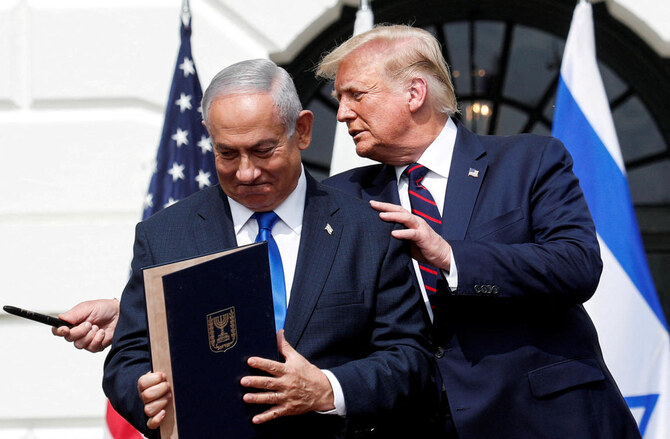Former President Donald Trump and Israeli Prime Minister Benjamin Netanyahu met Tuesday as the Israeli leader faces mounting pressure from his right-wing coalition to abandon a temporary truce with Hamas, while war-weary Israelis push for a resolution to the 15-month conflict and the return of hostages.

Trump, who took credit for brokering the ceasefire agreement last month, expressed skepticism about its longevity.
“I have no guarantees that the peace is going to hold,” Trump told reporters Monday.
The meeting focused on finalizing a second phase of the hostage deal, alongside discussions on Israel-Saudi normalization and Iran’s nuclear ambitions.
Netanyahu arrived in Washington as his political standing weakens. He is currently testifying in an ongoing corruption trial, facing allegations of exchanging favors with wealthy media figures—charges he calls a “witch hunt.”
His visit also marks his first trip abroad since the International Criminal Court issued arrest warrants in November, accusing him, former Israeli officials, and Hamas leaders of crimes against humanity. The U.S. does not recognize the ICC’s authority.
In Washington, Netanyahu and Trump’s Middle East envoy, Steve Witkoff, met Monday to lay groundwork for the next phase of the ceasefire. Netanyahu confirmed indirect negotiations with Hamas in Qatar will continue, with his security cabinet set to review Israel’s demands when he returns later this week.
Hard-right members of Netanyahu’s coalition are demanding a resumption of military operations in Gaza. Finance Minister Bezalel Smotrich has threatened to topple the government if fighting does not resume, potentially triggering early elections.
Meanwhile, Hamas insists it will not release more hostages without a full Israeli withdrawal from Gaza. Netanyahu, however, maintains that Israel will not stop military operations until Hamas is defeated and all hostages are freed.
Trump has floated relocating Palestinians from Gaza to Egypt and Jordan, despite firm rejection from both nations and opposition from Saudi Arabia, the UAE, Qatar, the Palestinian Authority, and the Arab League.
Nevertheless, Trump argues that Cairo and Amman might accept displaced Palestinians due to the U.S. aid they receive. Some of Netanyahu’s right-wing allies support the plan, viewing Gaza as “uninhabitable” for long-term resettlement.
Trump’s push for Palestinian resettlement could complicate Israel-Saudi normalization efforts. Saudi Arabia has maintained that any deal requires an end to the Gaza war and a credible pathway to Palestinian statehood.
“This push by Trump doesn’t square with the idea of a Palestinian state as we know it,” said Shibley Telhami, an expert on Middle East diplomacy. “It’s hard to see the Saudis going along with it.”
Netanyahu is also expected to urge Trump to take a tougher stance on Iran, seizing on recent Israeli military successes against Hamas and Hezbollah. With Iran’s air defenses weakened, Netanyahu sees an opportunity to act decisively against Tehran’s nuclear program.
“This is one of the most critical meetings between an American president and an Israeli prime minister,” said Eytan Gilboa, a U.S.-Israel relations expert. “What’s at stake here is not just bilateral ties, but the future of the Middle East.”



